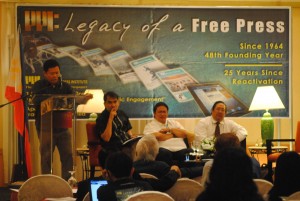Message to government: Heed UNHRC declaration
By: Fernando R. Cabigao Jr.
Lawyer advocates of free expression urged the press last April 24, 2012 during the 16th National Press Forum and general meeting of the Philippine Press Institute (PPI) to enjoin the Philippine government to heed the October 2011 UN Human Rights Committee (UNHRC) declaration that the Philippine libel law is excessive and incompatible with international human rights law.

(Photo by Lito Ocampo)
“It is better for journalists to be subjected to the civil nature of libel rather than its criminal nature,” said Lawyer Joel Butuyan, founder of the Center for International Law (CenterLaw), during his presentation on “Decriminalizing Libel” prepared by his co-founder, lawyer Harry Roque. Roque was supposed to speak in the forum but was unavailable.
Participating in the forum were members of the press, lawyers, and members of the academe.

Lawyer Joel Butuyan, founder of the Center for International Law. (Photo by Lito Ocampo)
Libel is still a criminal offense in the Philippines despite the UNHRC declaration that the Philippine libel law is “incompatible with Article 19, paragraph three of the International Covenant on Civil and Political Rights (ICCPR)” to which the Philippines is a signatory.
Article 355 of the 82-year-old Revised Penal Code (RPC) penalizes libel with a minimum of six months and one day’s imprisonment (prision correccional) and a fine ranging from P200 to P6, 000.
The UNHRC issued the October 2011 declaration in response to the complaint filed by Davao-based broadcaster Alexander “Lex” Adonis. Adonis was found guilty of libel in 2007 for reading over his radio program a tabloid report that Nograles had been caught in a compromising situation with his alleged paramour in a hotel in Manila. Adonis was paroled in December 2008.
Butuyan urged the press to enjoin the government to observe UNHRC declaration, which also suggested that the Philippine government review the Philippine libel law and compensate Adonis for the two years he served in prison.

(Photo by Lito Ocampo)
Eileen Mangubat, publisher of the Cebu Daily News, said libel cases in Cebu rarely get elevated to the courts. But she said the prospect of being arrested has a chilling effect on the media.
Butuyan pointed out that prosecutors especially in the provinces are afraid to antagonize politicians, and file libel cases in court even without finding probable cause for libel. “They simply tell the concerned journalists to defend themselves in court,” Butuyan said.
A reporter from a community newspaper said that aside from decriminalizing libel, something also needs to be done to compel complainants not to file complaints in other jurisdictions. “One of the main problems of community reporters being charged with libel are abusive complainants who file complaints in courts far from the journalist’s residence,” the reporter said.
[…] the Philippines, libel is a criminal offense. This, despite UN Human Rights Committee (UNHRC) declaration that the Philippine libel law is […]